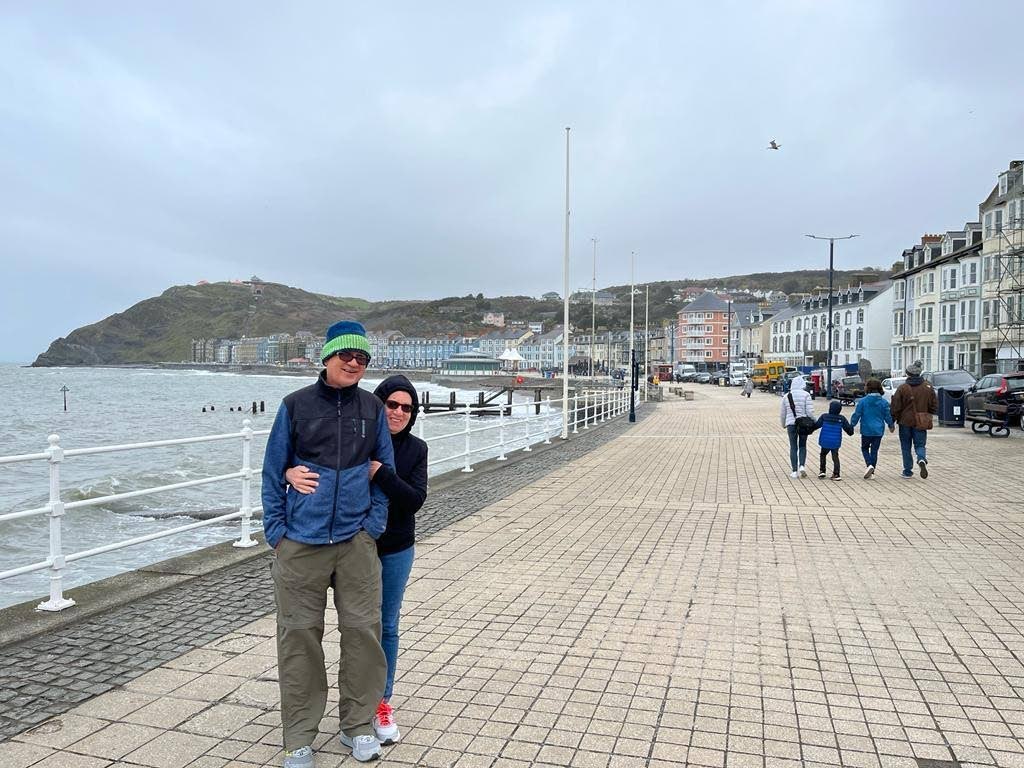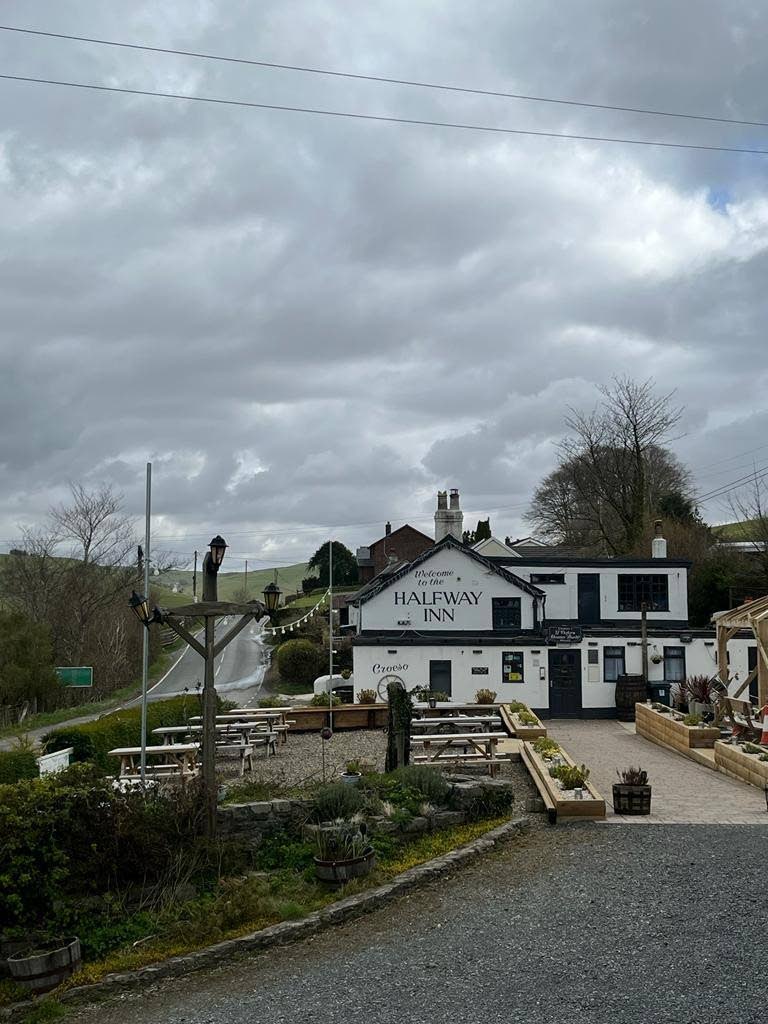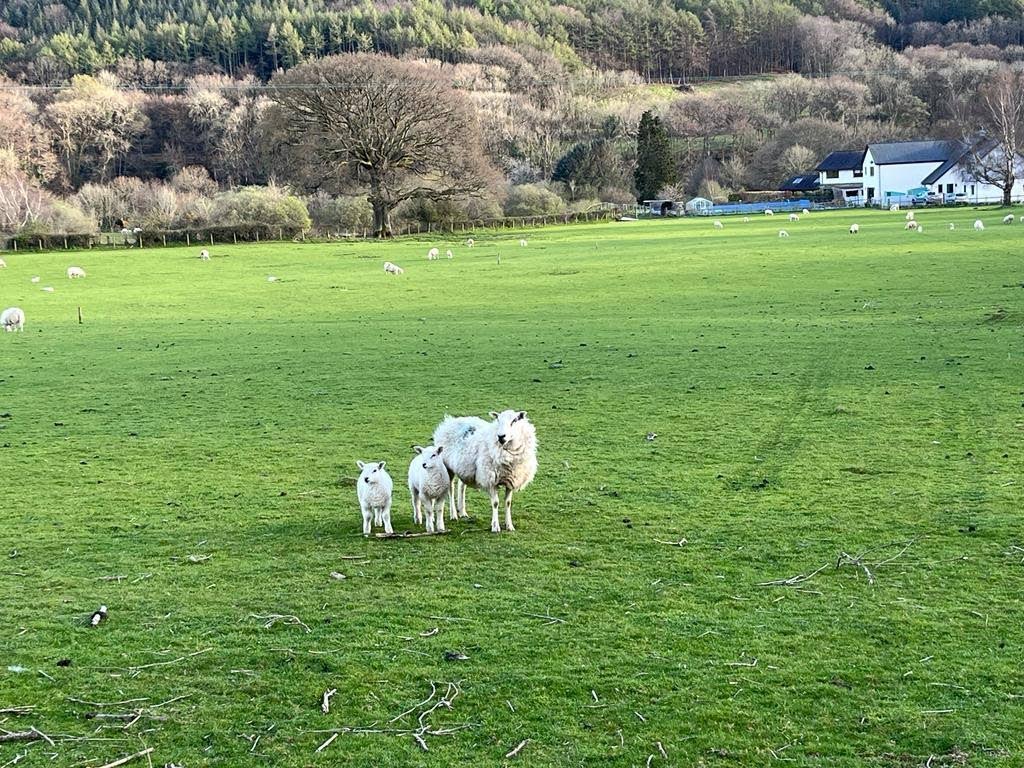Welcome to Wales: a Trini's travels during the pandemic

JAN WESTMAAS concludes his story on his travels during the pandemic. The first article was published on May 8.
Returning to the village in the Welsh countryside where we went to live so many years ago was the realisation of a dream I had been harbouring inside me for a long time.
Ceunant, the semi-detached house, on the Pennwlyn Estate that we lived in for two years, was, at least from the outside, in as good a condition as we had left it. Similarly, Eryl, the Manse, which we occupied for one year, had hardly changed. The present occupants, the vicar of the local church and his family, were eager to have us in for a cup of tea. We respectfully declined the invitation as Tim, Christine and I were in the middle of a brisk walk up the valley.
We wanted to see for ourselves whether the back road to the Half-Way Inn still existed. The pub, which I guess was half-way between town and country (hence the name) was a favourite with townies, rural folk and students alike. We finally found the road to the Inn as well as the shallow, clear water stream with its rocky bed.
Earlier, we sat in the conservatory, watching the sheep and the lambs in the field grazing and gambolling, while a farmer drove his tractor in the distance, I recalled Timothy, at the age of four, singing the farmer’s song he composed:
“I want to be a farmer to drive a tractor
And to take care of the baby lambs
In the fi-ee-elds”
Tim did not grow up to become a farmer. Passionate about the sea since his time as a scout at Presentation College, San Fernando, and following family tradition, he joined the British Royal Navy. He eventually became a commissioned officer, achieving the rank of lieutenant. One day he may yet attain the rank of Lieutenant Commander.

We had the two Welsh couples we had been close to, the Lands (Alma, retired nurse and Gordon, retired builder and clerk of works in the local council) and the Mitchells (Howard and Carol, both teachers) over for tea at the bungalow at separate times. We had a lot to talk about and to catch up on, including Tim’s stealing away on the back road (probably half a mile away) to get to the village shop to purchase sweets without any money.
Sadly, the shop was no longer in operation. The same with the two pubs in the village and the post office. Similarly, so many of our dear friends in the community had long passed. Gentle Mrs Crees to our right, hospitable Mrs Roberts to our left, chatty Emrys and wife Blod obliquely opposite, reserved but supportive Mrs Forty a few houses away. “Mr Forty is still alive but now lives in care. His daughter lives in the house that you know,” said Alma. Mr Forty was one of the few Englishmen on the housing estate, He was a taxi driver. His accent was distinctly non-Welsh but I couldn’t fathom the part of England he came from.
I had travelled alone from Trinidad to Wales to arrange accommodation for my family. Once this was done, I hired him, one day in August, 1983, to take me to Heathrow Airport (a five-hour drive) to fetch Christine and our three children, Nicholas, Nadia, and Timothy. I could have driven there myself as I had bought a used vehicle (Austin Allegro) from proceeds of the sale of our property in Tabaquite, Trinidad. However, having newly arrived and unfamiliar with the route to London, I preferred not to.
The old Allegro served us well, anyway, during our stay in Wales. In the summer of 1984 and 1985, it took us around England, Wales Scotland and France. I have a vivid memory of the summer of 1984. I drove with my uncle Buds, who was visiting from Trinidad, to Old Trafford, the famous cricket ground in Manchester, to witness the final day of a Test match between West Indies and England. We had won the game, and, eventually, the series 5-0.
It was a three-hour journey to Manchester from Capel Bangor. At that time, Waze, the popular Israeli-created road navigation app, did not exist. I relied on excellent road signage and a traditional road map. The following summer (1985), crossing the English Channel from Dover to Calais by ferry, I drove to France with my family for a mini-vacation. We stayed at a cottage (courtesy student friend, Scotsman Jim St Clair and his French wife) on a beach resort in the Somme area. We had a scare when Timothy pulled a disappearing act on us on a crowded beach!
Gordon, the only non-Welsh speaker of the four, was in his element with his South Wales gift of the gab and his Trini-style humour. He had not changed one bit. The morning we were returning to London, he and Alma, his charming Welsh-speaking wife who’s originally from North Wales, dropped by. “We came to see you go and to make sure you go,” he quipped while shedding a tear or two. “Gordon gets emotional in moments like this,” said Alma, who’s ten years his senior.

In 1988, two years after we returned home, the Lands including their bi-lingual son Ed, who was in Nadia’s class at the Capel Bangor school, were our guests in Trinidad. Today Ed, who’s now in his early 40s, is married to a Lithuanian. He is a serious sub-two hour 45 minutes marathoner and fitness coach. The visit of the Lands coincided with my ground-breaking tour to Caripe in Eastern Venezuela to visit the world-renowned, Cueva del Guacharo (Oil bird Cave) which the German explorer and naturalist, Humboldt, “discovered” in the 19th century. “Great experience,” said Gordon. “That tour and the duck curry at Ragoo’s bar near your home in Chaguanas I will never forget,” he added.
Our conversation with the Mitchells in the conservatory also turned to foreign travel. Howard, retired geography teacher at Penwedig, the school for Welsh-speaking students in downtown Aberystwyth, reminded me that he, his wife and three children were also part of the tour I organised to Venezuela when they visited us in Trinidad in 1989. It was a ten-day bus tour from Caracas to Merida and back. Apart from the magnificent views of the Andes, what impacted on him most was our encounter with the Venezuelan National Guard.
At my request, our bus driver stopped for a break at a nearby waterfall on our way to Choroni, a picturesque beach on the Caribbean coast. For variety in the tour itinerary, I had scheduled a night off-route in a cosy, environmentally friendly hotel in the village. To my horror, some members of the National Guard, evidently aware of the presence of a busload of foreigners in their presence, proceeded to place empty glass bottles on slabs of rock at the side of the waterfall. With pistols in hand, they, like children testing their skills against each other, fired live rounds, shattering the bottles. To me, the entire scene seemed surreal, yet it was happening before our eyes. To this day, I am not sure whether they were simply showing off or deliberately trying to instil fear in us. Venezuelan National Guards were, and still are, notorious for their treatment of our fishermen in the Gulf of Paria.
Fast forward to April, 2022. The day before returning to London from our Welsh holiday, we drove into town, found a place to park and we (parents, grandparents and children) embarked on a walking tour, with Tim our guide. Aber, as it’s still affectionately called, was very much the Aberystwyth we left in 1986. Apart from the building of a roundabout on the A44 on your approach to the town and the presence of a mall or two, not much had changed.
It was the same old, charming, university town, nestled between the Cambrian mountains and Cardigan Bay. Thanks to its large student population, including many foreigners, it is estimated that there are over 50 pubs per square mile in town. The long promenade on which we took leisurely walks in the 80s and the thousand and one Victorian and Edwardian buildings, still grace the seafront.
Among the buildings on the seafront, the original university, the Old College, a grade one 19th century listed building in Gothic style, still stands. It’s an architectural gem, awaiting funding to be transformed, according to the university planners, “into a major centre for learning, heritage, culture and enterprise…” The university had long moved most of its operations uphill to Penglais, not far from town, where most faculties, including law, are still based. It was a blustery morning on the prom but dressed for the moment, we were hardly bothered. In the twinkle of an eye, Ella, with Amelia after her, made for the beach, covered in parts with seashells and stones in all shapes, colours and sizes. Not surprisingly, with keen eyes on the children, Tim and Kasia gave them their well-deserved space. Little Ella, in all her innocence, gifted me a sea shell and a tiny "precious” stone that I will long cherish.
Our plan that morning was to visit Constitution Hill on the northern end of the promenade. Rising dramatically from the sea, it is accessible by foot but we chose to use the Aberystwyth Cliff Railway to get to the top. The service for tourists was opened in 1896 but, for some reason or the other, in the 1980s, we did not take advantage of the opportunity to experience this wonder of Wales. But, with Tim and Kasia’s prodding, we executed our plan.
It is the longest electric cable cliff railway in Britain. As we settled into our cable car, which we had virtually to ourselves, I could see the glee in everyone’s face as we were being hauled to the summit at a regal four miles per hour. Once we had reached the top, we had a spectacular view of the town, the bay and the surrounding mountain peaks.
Jan Westmaas is the author of Out of the Box, Tales of Travel (1972-2013). It’s available as an e-book on Amazon or email the author at westnaastouring@yahoo.com


Comments
"Welcome to Wales: a Trini’s travels during the pandemic"